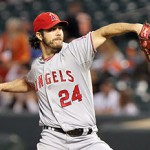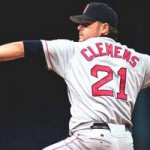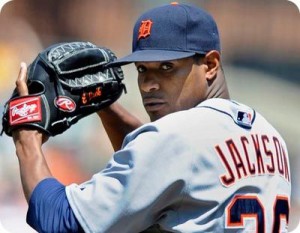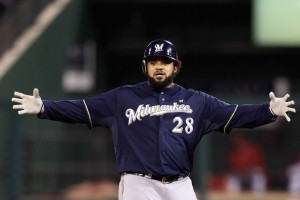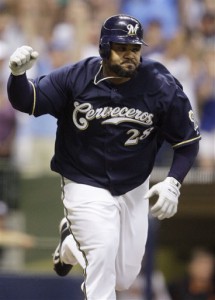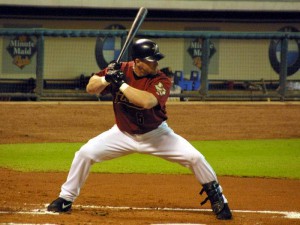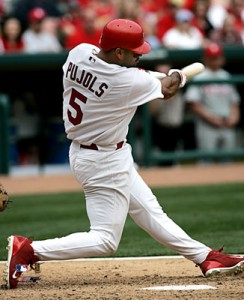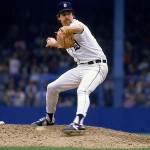
Can Jack Morris eventually be the first “1980s Starter” to make the Hall? Photo John Iacono via si.com
First off: I’m not a “small hall” guy. (How can you, when looking at the litany of obscure players the Veteran’s Committee has already enshrined while the current ballot has literally a dozen names that you can make an argument for?) So naturally I want to see enshrinement for a larger number of the “marquee” names in baseball’s history. I view the Hall of Fame as a museum dedicated to the game, and recognizing all the eras of the game for better or for worse. I’m for expanding the current ballot and If I had a vote i’d be maxing out the 10 names with a desire to put a couple more guys on.
I’m also distinctly of the opinion that maybe the era of baseball just prior to today’s is underrepresented in Cooperstown. Specifically, my theory is that the massive boom in offense that the game has seen in the last 20 years coupled with a distinct shift in the way pitching staffs are managed has led to voters and fans to discount and dismiss the accomplishments of players specifically from the 1980s.
MLB.com has a show called “Prime 9,” where they list the best 9 players/teams related to certain topics. Recently they showed the “Best 9 players of the 1980s” by position, and it led me to use that list as a starting point for a discussion of marquee players from the 1980s and to decide whether or not the decade is under represented in Cooperstown.
Here’s Prime 9’s top player by position and their Hall of Fame status. Throughout this entire article, Blue == Hall of Fame players while Red == non-Hall of Fame Players.
- RF: Dwight Evans: fell off HoF ballot on his 3rd attempt in 1999. Max votes: 10.4% in 1998.
- CF: Dale Murphy: fell of HoF ballot on his 15th attempt this year in 2013. Max votes: 23.2% in 2000.
- LF: Rickey Henderson: 1st ballot HoFamer in 2009 with 94.8% of the vote.
- SS: Cal Ripken Jr: 1st ballot HoFamer in 2007 with 98.5% of the vote.
- 3B: Mike Schmidt: 1st ballot HoFamer in 1995 with 96.5% of the vote.
- 2B: Ryne Sandberg: 3rd ballot HoFamer in 2005 with 76.2% of the vote.
- 1B: Don Mattingly: on current ballot, his 13th attempt. Max votes: 28.2% in 2001, his first year on the ballot.
- C: Gary Carter: 6th ballot HoFamer in 2003 with 78% of the vote.
- SP: Jack Morris: on current ballot, his 14th attempt. Max votes: 67.7% this year.
Four of the Nine players listed as “Best of the Decade” are not in the Hall of Fame. I think there’s something wrong here. I know Morris is incredibly polarizing and probably never gets in, while the other three guys (Evans, Murphy, Mattingly) each had knocks against them related to durability and peak that prevented them from being enshrined. Perhaps these are future Veteran’s committee picks.
I know the above list is arguable; perhaps those players aren’t necessarily the “best” at their positions for the decade. So lets talk about the leading candidates per position who didn’t make the Prime-9’s list, and their own HoF status. The MLB show didn’t distinguish between SP and RPs so I’ve separated them out below, nor did they distinguish between the OF positions like they did for the team selected above.
I’ve included the guys in the above “Prime 9” list in the lists below for ease of analysis by position.
(Coincidentally; as you read the vote percentage totals, keep in mind that a voting percentage of less than 1% means that the player got only a handful of votes from the 500+ votes tallied each year, a woefully small number).
Outfielders:
- Dwight Evans: fell off HoF ballot on his 3rd attempt in 1999. Max votes: 10.4% in 1998.
- Dale Murphy: fell of HoF ballot on his 15th attempt this year in 2013. Max votes: 23.2% in 2000.
- Rickey Henderson: 1st ballot HoFamer in 2009 with 94.8% of the vote.
- Andre Dawson: 9th ballot HoFamer in 2010 with 77.9% of the vote.
- Tim Raines: on current ballot, his 6th attempt. Max votes: 52.2% this year.
- Dave Parker: fell of HoF ballot on his 15th attempt this year in 2011. Max votes: 24.5% in 1998.
- Fred Lynn: fell off HoF ballot on his 2nd attempt in 1997. Max votes: 5.5% in 1996.
- Kirk Gibson: fell off HoF ballot on his 1st attempt in 2001 with only 2.5% of the voting.
- Dave Winfield: 1st ballot HoFamer in 2001 with 84.5% of the vote.
- Kirby Puckett: 1st ballot HoFamer in 2001 with 82.1% of the vote.
- Tony Gwynn: 1st ballot HoFamer in 2007 with 97.6% of the vote.
- Pedro Guerrero: fell off HoF ballot on his 1st attempt in 1998 with only 1.3% of the voting.
- Jim Rice: 15th ballot HoFamer in 2009 with 76.4% of the vote.
- Daryl Strawberry: fell off HoF ballot on his 1st attempt in 2005 with only 1.2% of the voting.
- Jack Clark: fell off HoF ballot on his 1st attempt in 1998 with only 1.5% of the voting.
- Andy Van Slyke: fell off HoF ballot on his 1st attempt in 2001 without receiving a single vote.
This makes for 16 total outfielders on the “Best of the decade” list. Of those 16 outfielders, 10 are not in the Hall of Fame. Would you say that the position is under-represented in the Hall if only 6 outfielders from an entire decade of the sport are enshrined? Maybe, maybe not. To say nothing of the fact that 2 of these 6 HoFame 80s outfielders (Rice and Dawson) were heavily criticized upon enshrinement for being voted in based on remnants of “old man” statistics.
Jack Clark you say? 50 Career WAR. That’s nothing to shake a stick at. Higher than a number of Hall of Fame hitters. I remember him being more of a power hitter than he turned out to be. He just couldn’t stay healthy; only 5 seasons where he played close to a “full season” in 18 years in the league. I remember him fondly from my childhood; my family is from San Francisco and I always rooted for the Giants as a kid.
Middle Infielders:
- Cal Ripken Jr: 1st ballot HoFamer in 2007 with 98.5% of the vote.
- Ryne Sandberg: 3rd ballot HoFamer in 2005 with 76.2% of the vote.
- Garry Templeton: fell off HoF ballot on his 1st attempt in 1998 with only 0.4% of the voting.
- Ozzie Smith: 1st ballot HoFamer in 2002 with 91.7% of the vote.
- Alan Trammell: on current ballot, his 12th attempt. Max votes: 36.8% last year.
- Robin Yount: 1st ballot HoFamer in 1999 with 77.5% of the vote.
- Lou Whitaker: fell off HoF ballot on his 1st attempt in 2001 with only 2.9% of the voting.
- Dave Conception: fell of HoF ballot on his 15th attempt this year in 2008. Max votes: 16.9% in 1998.
Lots of baseball pundits have lamented Whitaker’s fate, while plenty others vociferiously argue for Trammell, who had the misfortune of being both the 2nd best offensive SS (to Ripken) and the 2nd best defensive SS (to Smith) of his era simultaneously, thus being overshadowed by both. Conception was about an equal at the plate to Ozzie Smith but only about half the Gold Gloves, but still seems like he deserved a bit more credit than he got in the voting.
Third Basemen
- Mike Schmidt: 1st ballot HoFamer in 1995 with 96.5% of the vote.
- Wade Boggs: 1st ballot HoFamer in 2005 with 91.9% of the vote.
- George Brett: 1st ballot HoFamer in 1999 with 98.2% of the vote.
- Paul Molitor: 1st ballot HoFamer in 2004 with 85.2% of the vote.
- Terry Pendleton: fell off HoF ballot on his 1st attempt in 2004 with only 0.2% of the voting.
- Tim Wallach: fell off HoF ballot on his 1st attempt in 2002 with only 0.2% of the voting.
- Buddy Bell: fell off HoF ballot on his 1st attempt in 1995 with only 1.7% of the voting.
Four first ballot hall of fame 3rd Basemen played in the era (even if most consider Molitor primarly a DH later in his career) which is saying something considering there are only 12 full time 3rd baseman in the Hall from all of history. The all-star game starters for the entire decade were almost entirely Schmidt, Boggs and Brett. The others I fully acknowledge are “stretches” but did each have several all-star appearances during the decade.
First Basemen
- Don Mattingly: on current ballot, his 13th attempt. Max votes: 28.2% in 2001, his first year on the ballot.
- Steve Garvey: fell of HoF ballot on his 15th attempt this year in 2007. Max votes: 42.6% in 1995.
- Eddie Murray: 1st ballot HoFamer in 2003 with 85.3% of the vote.
- Keith Hernandez: fell off HoF ballot on his 9th attempt in 2004. Max votes: 10.8% in 1998.
- Mark McGwire: on current ballot, his 7th attempt. Max votes: 23.7% in 2010.
Not much to say here: There seemed to be a definite lack of quality first basemen for the decade; only one is enshrined in the Hall. Many of the all-star 1B appearances early in the decade went to aging stars Rod Carew and Pete Rose, who by that point in their long careers had been moved to first base for defensive purposes. McGwire’s issues are obvious (and he’s clearly more well known for his exploits in the 1990s, so its arguable if he even belongs in this 1980’s centric discussion).
Catchers
- Gary Carter: 6th ballot HoFamer in 2003 with 78% of the vote.
- Carlton Fisk: 2nd ballot HoFamer in 2000 with 79.6% of the vote.
- Lance Parrish: fell off HoF ballot on his 1st attempt in 2001 with 1.7% of the voting.
- Benito Santiago: fell off HoF ballot on his 1st attempt in 2011 with 0.2% of the voting.
- Darrell Porter: fell off HoF ballot on his 1st attempt in 1993 with zero (0) votes.
- Tony Pena: fell off HoF ballot on his 1st attempt in 2003 with0.4% of the voting.
- Bob Boone: fell off HoF ballot on his 5th attempt in 2000. Max votes: 7.7% in 1996.
- Terry Kennedy: fell off HoF ballot on his 1st attempt in 1997 with exactly one (1) vote.
Yes, I’m really stretching for 1980s catchers. Basically Carter made the all-star team every year for the NL while Fisk made half the All Star Starts for the AL during the same time. The backups were generally catchers having a decent first half, many of whom never made an other all-star team. Boone was better than you remember, hence his hanging around the bottom of the ballot for a few years.
Closers/Relievers
- Lee Smith: on current ballot, his 11th attempt. Max votes: 50.6% in 2012.
- Bruce Sutter: 13th ballot HoFamer in 2006 with 76.9% of the vote.
- Dennis Eckersley: 1st ballot HoFamer in 2004 with 83.2% of the vote.
- Rich Gossage: 9th ballot HoFamer in 2008 with 85.8% of the vote.
- Jeff Reardon: fell off HoF ballot on his 1st attempt in 2000 with 4.8% of the voting.
- Tom Henke: fell off HoF ballot on his 1st attempt in 2004 with 0.6% of the voting.
- Dan Quisenberry: fell off HoF ballot on his 1st attempt in 1996 with 3.8% of the voting.
- Kent Tekulve: fell off HoF ballot on his 1st attempt in 1995 with 1.3% of the voting.
- Willie Hernandez: fell off HoF ballot on his 1st attempt in 1995 with 0.4% of the voting.
I’m not going to vociferously argue for Relievers/Closers to be inducted, since I think they’re mostly overrated in terms of their contributions to wins. But I will say that a couple of these guys were far better than you remember. Take Tom Henke: career 157 ERA+, which was better than either Sutter or Gossage PLUS he had more career saves (311 for Henke compared to 310 for Gossage and 300 for Sutter). How exactly are two of these three guys Hall of Famers while Henke got exactly 6 votes out of 515 his first time on the ballot? These voting patterns just seem drastically inconsistent.
All the above though pales in comparison to what we’re about to see.
Starters
- Jack Morris: on current ballot, his 14th attempt. Max votes: 67.7% this year.
- Steve Carlton: 1st ballot HoFamer in 1994 with 95.6% of the vote.
- Dave Stewart: fell off HoF ballot on his 2nd attempt in 2002. Max votes: 7.4% in 2001.
- Frank Viola: fell off HoF ballot on his 1st attempt in 2002 with 0.4% of the voting.
- Rick Sutcliffe: fell off HoF ballot on his 1st attempt in 2000 with 1.8% of the voting.
- Dave Steib: fell off HoF ballot on his 1st attempt in 2004 with 1.4% of the voting.
- Bob Welch: fell off HoF ballot on his 1st attempt in 2000 with 0.2% of the voting.
- Brett Saberhagen: fell off HoF ballot on his 1st attempt in 2007 with 1.3% of the voting.
- Orel Hershiser: fell off HoF ballot on his 2nd attempt in 2007. Max votes: 11.2% in 2006.
- Dwight Gooden: fell off HoF ballot on his 1st attempt in 2006 with 3.3% of the voting.
- Mike Scott: fell off HoF ballot on his 1st attempt in 1997 with 0.4% of the voting.
- Rick Reuschel: fell off HoF ballot on his 1st attempt in 1997 with 0.4% of the voting.
- Fernando Valenzuela: fell off HoF ballot on his 2nd attempt in 2004. Max votes: 6.2% in 2003.
- Nolan Ryan: 1st ballot HoFamer in 1999 with 98.8% of the vote.
- Denny Martinez: fell off HoF ballot on his 1st attempt in 2004 with 3.2% of the voting.
- Bert Blyleven: 14th ballot HoFamer in 2011 with 79.7% of the vote.
- Jimmy Key: fell off HoF ballot on his 1st attempt in 2004 with 0.6% of the voting.
- Ron Guidry: fell off HoF ballot on his 9th attempt in 2002. Max votes: 8.8% in 2000.
- John Tudor: fell off HoF ballot on his 1st attempt in 1996 with 0.4% of the voting.
- Roger Clemens: on current ballot, his 1st attempt. Max votes: 37.6% in 2013.
Here is where I think I really have a problem with the Hall of Fame treatment players in the 1980s; I think the entire generation of Starting Pitchers has been generally underrated and overlooked. Look at this list of pitchers and look at the number of guys who failed to even stay on the ballot for more than one season. Meanwhile, you can argue that the three guys who ARE on this list who are in the Hall of Fame (Carlton, Ryan and Blyleven) all actually “belong” to the 1970s; they just happened to have longer careers that bled into the 1980s. Clemens appears here because his late 80s debut was so strong but clearly he’s a player of the 90s, and his reasons for non-inclusion thus far are obvious.
Do you mean to tell me that NONE of these other 1980’s starters merits inclusion to the Hall of Fame? That an entire decade of starting pitchers doesn’t historically merit inclusion? I’m not going to argue that all (or most) of these players belong, but it is kind of shocking that so many of the leading pitchers of that era were given so little consideration.
My biggest beef may be with Saberhagen. Here’s the side-by-side stats of Saberhagen and a Mystery pitcher we’ll identify in a moment:
|
Wins |
Losses |
IP |
K’s |
ERA |
ERA+ |
bWAR |
| Saberhagen |
167 |
117 |
2562 2/3 |
1715 |
3.34 |
126 |
56 |
| Mystery Player |
165 |
87 |
2324 1/3 |
2396 |
2.76 |
131 |
50.3 |
Pretty close, no? Saberhagen contributed more WAR and was nearly this player’s equal in ERA+, which adjusts to the eras. Mystery player’s W/L record is better … but then again, havn’t we learned that wins and losses are meaningless stats now? A couple more facts here: Saberhagen won two Cy Young awards while the Mystery player won Three. Saberhagen led the league in ERA just once while Mystery player did it 5 years in a row.
The Mystery player here (if you havn’t already guessed) is none other than Sandy Koufax. Now, I’m certainly not saying that Saberhagen is the equal of Koufax, certainly not when you look at Koufax’s last 5 seasons or his 4 no-hitters. My point is this: Koufax was a first ballot hall of famer … and Saberhagen got 7 votes out of 545 ballots. Saberhagen may not be a Hall of Famer but he deserved to be in the discussion longer than he was.
Others have mentioned the lack of support for Dave Steib, who had a relatively similar statistical case to Saberhagen. Similar career bWAR (53.5), similar ERA+ (122), and similar injury issues that curtailed his career. Steib’s award resume isn’t as impressive (zero Cy Youngs but 7 All-Star appearances in his first 11 seasons), and he was basically done as an effective player by the time he was 33.
There are some other surprises on this list too. Jimmy Key you say? Go look at his career stats and you’ll be surprised just how good he was. 186-117, a 3.51 ERA (which sounds mediocre) but a career 122 ERA+. A couple of stellar seasons (two 2nd place Cy Young votes). I’m not saying he’s a hall of famer, but I am saying that he was better than you remember. There’s absolutely pitchers in the Hall with worse ERA+ than Key’s.
Coincidentally, you can make the argument that many of these players really “belonged” to a different decade, if you wanted to really just focus this discussion on the 1980 decade.
- Fisk, Boone, Conception, Parker, Lynn, Rice, Garvey, Carlton, Ryan, Reuschel and to a certain extent Winfield were really players who mostly “belong” in the 1970s.
- Blyleven and Brett’s careers equally spanned both the 70s and 80s.
- Gooden, Van Slyke, Puckett, McGwire, Clemens and Pendleton had careers that started the late 80s but who flourished mostly in the 1990s.
But, I think the point is made, especially when it comes to pitchers. So I left all these players in.
Here’s a couple other ways to look at the best players of the 1980s. Here’s a list of the top 20 positional players by “Win Shares” for the decade (data cut and pasted from an online forum). As with above, blue=hall of famer while red indicates not.
1. Rickey Henderson 289
2. Robin Yount 274
3. Mike Schmidt 265
4. Eddie Murray 250
5. Tim Raines 246
6. Dale Murphy 244
7. Wade Boggs 237
8. Dwight Evans 230
9. George Brett 229
10. Keith Hernandez 221
11. Pedro Guerrero 221
12. Cal Ripken 219
13. Alan Trammell 219
14. Gary Carter 215
15. Jack Clark 213
16. Lou Whitaker 205
17. Andre Dawson 204
18. Ozzie Smith 204
19. Paul Molitor 198
20. Dave Winfield 193
Most HoFame pundits lament the lack of support for Raines specifically, but it is interesting to see how high up both Murphy and Evans fall on this list.
Now, here’s Pitcher WAR accumulated in the 1980s. I took this data from a posting on BeyondtheBoxScore blog back in 2010, who was arguing (of course) why Jack Morris didn’t deserve to be in the hall of fame. However, the table here also illustrates nicely who were really the best pitchers of the decade, and most of these guys are in the list above.
| Rank |
Name |
bWAR |
From |
To |
Age |
Wins |
Losses |
| 1 |
Dave Stieb |
45.2 |
1980 |
1989 |
22-31 |
140 |
109 |
| 2 |
Bob Welch |
35.1 |
1980 |
1989 |
23-32 |
137 |
93 |
| 3 |
Fernando Valenzuela |
34.8 |
1980 |
1989 |
19-28 |
128 |
103 |
| 4 |
Bert Blyleven |
34 |
1980 |
1989 |
29-38 |
123 |
103 |
| 5 |
Orel Hershiser |
32.8 |
1983 |
1989 |
24-30 |
98 |
64 |
| 6 |
Roger Clemens |
32.3 |
1984 |
1989 |
21-26 |
95 |
45 |
| 7 |
Nolan Ryan |
30.8 |
1980 |
1989 |
33-42 |
122 |
104 |
| 8 |
Dwight Gooden |
30.2 |
1984 |
1989 |
19-24 |
100 |
39 |
| 9 |
John Tudor |
29.7 |
1980 |
1989 |
26-35 |
104 |
66 |
| 10 |
Bret Saberhagen |
29 |
1984 |
1989 |
20-25 |
92 |
61 |
| 11 |
Charlie Hough |
28.7 |
1980 |
1989 |
32-41 |
128 |
114 |
| 12 |
Jack Morris |
27.9 |
1980 |
1989 |
25-34 |
162 |
119 |
| 13 |
Mario Soto |
27.3 |
1980 |
1988 |
23-31 |
94 |
84 |
| 14 |
Teddy Higuera |
27.3 |
1985 |
1989 |
26-30 |
78 |
44 |
| 15 |
Rick Sutcliffe |
26.7 |
1980 |
1989 |
24-33 |
116 |
93 |
| 16 |
Rick Reuschel |
25.7 |
1980 |
1989 |
31-40 |
97 |
82 |
| 17 |
Steve Carlton |
25.6 |
1980 |
1988 |
35-43 |
104 |
84 |
| 18 |
Ron Guidry |
25.5 |
1980 |
1988 |
29-37 |
111 |
72 |
| 19 |
Frank Viola |
25.1 |
1982 |
1989 |
22-29 |
117 |
98 |
| 20 |
Dan Quisenberry |
24.6 |
1980 |
1989 |
27-36 |
53 |
43 |
| 21 |
Mark Gubicza |
24.6 |
1984 |
1989 |
21-26 |
84 |
67 |
I’m not sure why he ran this list to 21 players; perhaps he really likes Mark Gubicza.
Notice the same 3 names appear here as appeared above for Hall of Fame starters. Also notice the surprisingly high appearances of players like Soto and Higuera; I didn’t even include them in the above analysis, perhaps providing my own bias because certainly I wouldn’t have included these two in any conversation about the best pitchers of the 80s. But the point is now made statistically; of the 20 best pitchers by WAR for the entire decade, only 3 are enshrined in the Hall.
I havn’t done this analysis for other decades but I’d be surprised if other decades were so underrepresented. Think about how many obvious hall of famers pitched in the 1990s; Just off the top of my head: Clemens, Mussina, Maddux, Glavine, Smoltz, Johnson, Pedro, Schilling and perhaps eventually Hoffman and Rivera. Maybe guys like Cone and Pettitte deserve more thought. Lee Smith is still on the ballot. That’s a lot of names for one decade as compared to what’s happened to the 1980s guys.
So, after all this, do we think the 1980s players are underrepresented in the Hall? I count 17 positional players, 3 relievers and 3 starters from the era. Perhaps the answer is, “there’s plenty of positional representation but the Starters are not fairly represented.”
Why are there so few starters from this era enshrined? Did we just see a relatively mediocre time period in baseball with respect to starting pitchers? Did we just get unlucky with the longevity and injury issues related to the best pitchers of the era (Hershiser, Saberhagen, Steib)? Did changes in bullpen management that came about in the 90s (lefty-lefty matchups and more specialized relievers) combined with increasing awareness/sensitivety to pitch counts (100 pitches and you’re out) contribute to this fact? If you’re a starter and the assumption is that you’re pitching 9 innings no matter what your pitch count is, you’re going to approach the game differently and pitch with a different level of effort than if you knew you were getting the hook after 100 pitches and/or in roughly the 6th or 7th inning. Did this contribute to more mediocre-appearing ERAs for starters of this era? Is that a good argument to use, as compared to 90s’ and modern pitchers who go all-out for 7 innings and then sit (versus starters of the 90s, who would often face the 3-4-5 of the opposing team a FOURTH time in the late innings while sitting on 140 pitches)?
What do you guys think?

